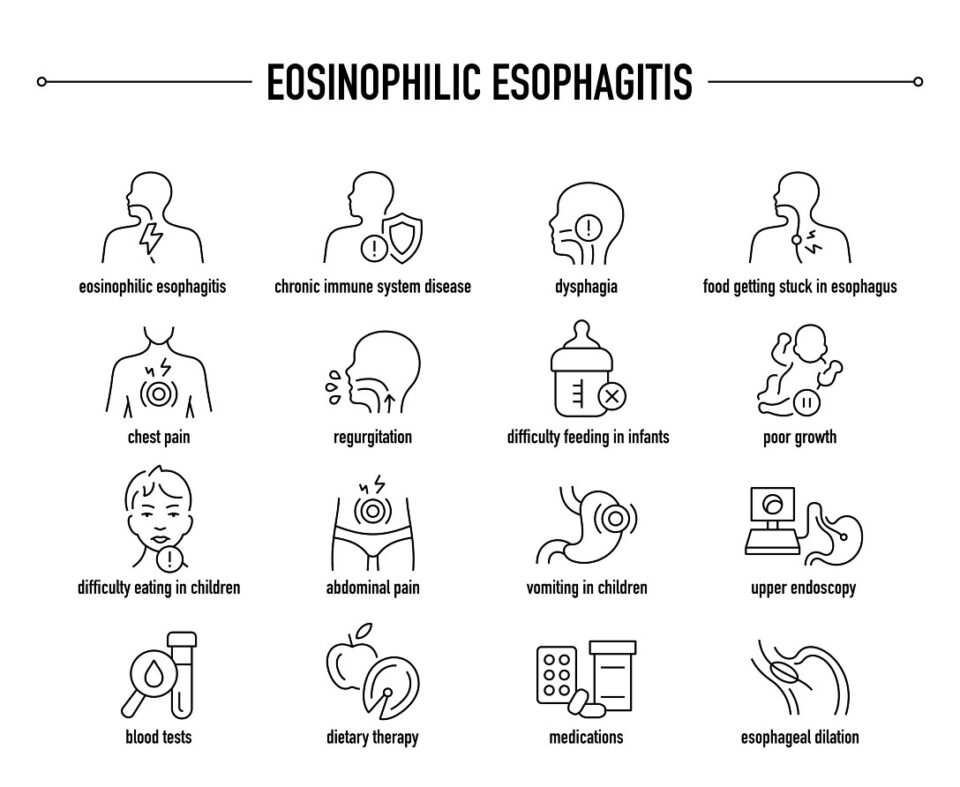Eosinophilic Esophagitis Treatment
In the realm of gastrointestinal health, addressing eosinophilic esophagitis requires specialized care, and at GI Specialists of Georgia in Atlanta, GA, our dedicated team is here to provide comprehensive eosinophilic esophagitis treatment. Understanding the triggers of eosinophilic esophagitis is crucial in developing effective strategies for managing this inflammatory condition of the esophagus. If you're seeking a potential eosinophilic esophagitis cure, our experienced gastroenterologists have the knowledge and expertise to tailor treatment plans to your unique needs. If you are dealing with eosinophilic esophagitis, take a proactive step toward relief. Schedule an appointment with GI Specialists of Georgia and let our specialized care guide you towards improved digestive health.

What is Eosinophilic Esophagitis?
Eosinophilic esophagitis (EoE) is a chronic inflammatory condition of the esophagus characterized by the presence of an elevated number of eosinophils, a type of white blood cell, in the esophageal tissue. This immune response is triggered by an allergic reaction to certain foods or environmental factors, leading to symptoms such as difficulty swallowing, chest pain, and food impaction. EoE is often diagnosed through endoscopic procedures and biopsy, and management typically involves dietary modifications, medications, and, in some cases, elimination diets to identify specific triggers.

Eosinophilic Esophagitis Diagnosis
Eosinophilic esophagitis diagnosis involves a comprehensive approach to identify and confirm the presence of elevated eosinophils in the esophageal tissue. Typically initiated by symptoms such as difficulty swallowing, chest pain, or food impaction, the diagnostic process often includes endoscopic procedures, such as esophagogastroduodenoscopy (EGD), allowing for direct visualization of the esophagus. During the procedure, multiple biopsies are taken from various sections of the esophagus to assess the eosinophil count. A definitive diagnosis of EoE is established when a specific threshold of eosinophils, typically 15 or more eosinophils per high-power field, is observed in the esophageal tissue. This thorough diagnostic evaluation enables healthcare professionals to tailor treatment strategies effectively, addressing the underlying allergic inflammation contributing to EoE.
Eosinophilic Esophagitis Symptoms
The symptoms of eosinophilic esophagitis reflectesophageal inflammation triggered by allergic responses. These symptoms include:
- Difficulty Swallowing – EoE can lead to dysphagia, causing difficulty or discomfort while swallowing, often resulting in a sensation of food getting stuck in the throat.
- Chest Pain – Individuals with EoE may experience chest pain or discomfort resembling symptoms of gastroesophageal reflux disease (GERD) that persist despite acid-reducing medications.
- Food Impaction – EoE can cause episodes of food impaction, where solid food becomes lodged in the esophagus, requiring medical intervention for removal.
Eosinophilic Esophagitis Causes
Eosinophilic esophagitis arises from immune-mediated responses to allergens, leading to chronic inflammation in the esophagus. These causes include:
- Allergic Reactions to Foods – EoE is often triggered by allergic responses to specific foods, commonly dairy, wheat, soy, or eggs, prompting an immune system reaction in the esophageal tissue.
- Environmental Allergens – Sensitivity to environmental allergens such as pollen or dust mites can contribute to EoE, with exposure leading to an inflammatory response in the esophagus.
- Genetic Predisposition – Genetic factors may play a role in predisposing individuals to EoE, as certain genetic markers are associated with an increased susceptibility to this allergic esophageal condition.

Our Comprehensive Treatment Options
At GI Specialists of Georgia, we prioritize comprehensive and personalized treatment strategies for individuals diagnosed with eosinophilic esophagitis. Our approach encompasses a range of therapeutic options tailored to address the underlying allergic inflammation in the esophagus. Treatment modalities may include dietary modifications, eliminating specific allergens, or employing elemental diets. Additionally, medications such as proton pump inhibitors, topical steroids, or immunomodulators may be prescribed to manage symptoms and reduce eosinophilic infiltration. In challenging cases, our experienced team may explore advanced interventions, such as endoscopic dilation or biologic therapies, to achieve optimal outcomes.
Contact GI Specialists of Georgia to Schedule a Consultation
GI Specialists of Georgia is your dedicated partner for specialized eosinophilic esophagitis treatment services in Atlanta, GA. With a profound understanding of the triggers and intricacies linked to this inflammatory condition, our experienced gastroenterologists prioritize personalized treatment plans, whether you're exploring potential cures or managing eosinophilic esophagitis. Should you suspect eosinophilic esophagitis or seek a thorough diagnosis, take the crucial step toward relief. Schedule an appointment with GI Specialists of Georgia to tap into our expertise in eosinophilic esophagitis diagnosis, and let our specialized care guide you towards enhanced digestive health.
Schedule an Appointment with Our Atlanta-Area Gastroenterologists
Whether you’re here for an endoscopic ultrasound or a colonoscopy, we will treat you with the utmost respect and dignity. Our gastroenterologists in the Douglasville and Northwest Atlanta area believe in the importance of educating our patients on a variety of health topics, ranging from anemia to gastrointestinal infections, cirrhosis of the liver, and pancreatitis. To schedule an appointment with one of our board-certified gastroenterologists, please contact GI Specialists of Georgia today.
"*" indicates required fields

